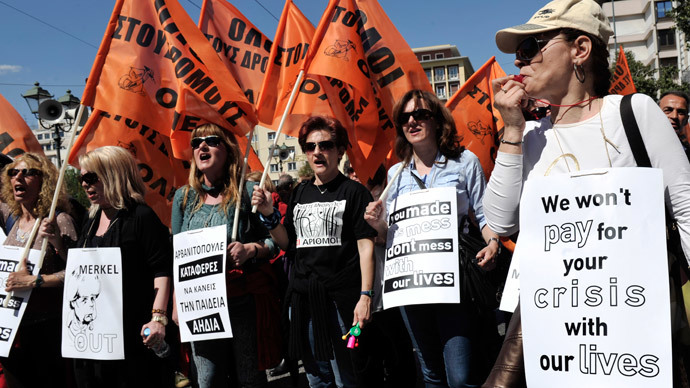‘No way out for Greece while the same policies of austerity are implemented’

Greece has become a social experiment for the implementation of the most extreme neo-liberalism aimed at not contaminating the eurozone during the first period of the crisis, with the same policies being followed now, Greek MEP George Katrougalos told RT.
RT:The Wall Street Journal recently suggested the IMF owes Greece an apology for making its financial struggle worse than it originally was. How do you see it?
George Katrougalos: It’s obvious that the rules suggested by the IMF were more lethal for Greece than the disease itself, the crisis. Just look at the numbers: when we entered this security mechanism our debt was at 120 percent of GDP, now it is at 175 percent, unemployment is now above 28 percent and the unemployment of the young people is at a stagnant number of 60 percent. This is social misery, without any kind of rebounding of the real economy.
RT:The EU began bailing out Greece four years ago. Any positive changes since then or it is mostly a failure?
GK: The IMF implements wherever it goes the same project of social engineering – deregulation of the market, privatizations. So it is not exactly a failure, from the view point of the IMF it is a success because they are actually fundamentalists of their market and from all this process they are people that are winning money. Have in mind that our ports, our enterprises in electricity, of communications, all of them are sold for pennies to Germans, French and even to the Chinese.
RT:Did austerity help avoid the looming default?
GK: Well, it is not a default technically that we had a massive bailout that actually undermines all our insurance funds because they have been the primary insurance funds that paid this bailout. It happened only to the profit of the French and German banks that had the time to sell out all of their bonds. So we had not officially had a default, but we had a bankruptcy of the society in the Greek economy.
RT:When Greece first joined the EU, wasn't there a calculation made that the country wouldn't make it inside the Eurozone?
GK: Actually, Greece has become a kind of a social experiment for the implementation of the most extreme neo-liberalism [with the aim] of not contaminating the eurozone during the first period of the crisis in 2010. The same project is still being implemented and this is a problem. There is no way out while the same policies of austerity are implemented.
RT:Why then the same policies are still in practice?
GK: Well, it is a kind of social engineering project because what they have in mind at the IMF is what we call the Washington consensus. That is a plan to move on from what we had in Europe, the so-called social model, towards a different kind of economic regulation. To put it in simple words, the state that has a market that is regulated by labor law, by social rights [needs] to pass to a different kind of market, completely free, completely liberated from the regulation of social rights and labor law.
RT:Is there a successful example of a country which has followed the IMF recommendations?
GK: It depends, it looks like for all the countries of the European South until now the European unification, at least the European monetary unification, was not a very profitable experience. Just have in mind that if you look at the deficits of the countries of the South they are exactly the same as the surpluses that Germany and the other core countries are gaining. So the architecture of the euro has resulted in a kind of dual situation in the EU. There are countries that are winning but there are also countries that are classical losers. There is not even one country that won from the IMF, whenever speaking about Germany who is gaining a lot of surpluses because of the way the European monetary unification works. But even compare the experiences of countries that have been under the IMF projects we cannot find anybody that was a winner. Maybe we will find countries like Korea who did not lose so much. But in my opinion there no country can claim that it gained from this experience.
The statements, views and opinions expressed in this column are solely those of the author and do not necessarily represent those of RT.
The statements, views and opinions expressed in this column are solely those of the author and do not necessarily represent those of RT.












